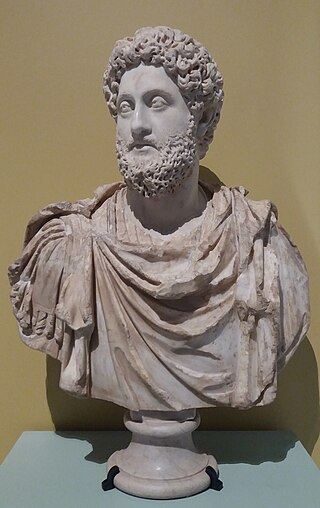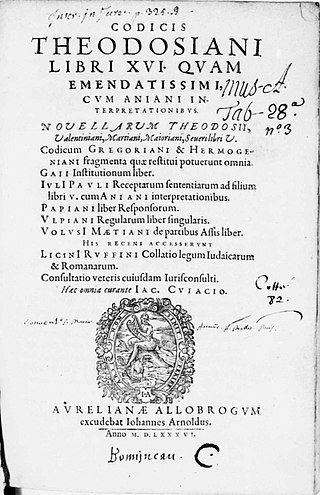Related Research Articles

Commodus was a Roman emperor who ruled from 177 to 192. He served jointly with his father Marcus Aurelius from 177 until the latter's death in 180, and thereafter he reigned alone until his assassination. His reign is commonly thought of as marking the end of a golden period of peace in the history of the Roman Empire, known as the Pax Romana.

The gens Petronia was a plebeian family at ancient Rome. This gens claimed an ancient lineage, as a Petronius Sabinus is mentioned in the time of Lucius Tarquinius Superbus, the last of the Roman kings, but few Petronii are mentioned in the time of the Republic. They are frequently encountered under the Empire, holding numerous consulships, and eventually obtaining the Empire itself during the brief reign of Petronius Maximus in AD 455.

Lucius Mussius AemilianussignoAegippius who held a number of military and civilian positions during the middle of the third century. He is best known as a Roman usurper during the reign of Gallienus.

The gens Aurelia was a plebeian family at ancient Rome, which flourished from the third century BC to the latest period of the Empire. The first of the Aurelian gens to obtain the consulship was Gaius Aurelius Cotta in 252 BC. From then to the end of the Republic, the Aurelii supplied many distinguished statesmen, before entering a period of relative obscurity under the early emperors. In the latter part of the first century, a family of the Aurelii rose to prominence, obtaining patrician status, and eventually the throne itself. A series of emperors belonged to this family, through birth or adoption, including Marcus Aurelius and the members of the Severan dynasty.

Lucius Volusius Maecianus was a Roman jurist, who advised the Emperor Antoninus Pius on legal matters, as well educating his son the future Marcus Aurelius in the subject. Originally of the equestrian class, Maecianus held a series of imperial offices culminating with prefect of Egypt in 161, when Marcus Aurelius adlected him inter praetorios, or with the rank of praetor, into the Roman Senate. Maecianus was suffect consul in an undetermined nundinium around AD 166.

The praefectus annonae, also called the praefectus rei frumentariae was a Roman official charged with the supervision of the grain supply to the city of Rome. Under the Republic, the job was usually done by an aedile. However, in emergencies, or in times of extraordinary scarcity, someone would be elected to the office, and would take charge of supplying the entire city with provisions.
Marcus Aurelius Cleander, commonly known as Cleander, was a Roman freedman who gained extraordinary power as chamberlain and favourite of the emperor Commodus, rising to command the Praetorian Guard and bringing the principal offices of the Roman state into disrepute by selling them to the highest bidder. His career is narrated by Dio Cassius, Herodian and the Historia Augusta.
Sextus Tigidius Perennis served as Praetorian Prefect under the Roman emperor Commodus. Perennis exercised an outsized influence over Commodus and was the effective ruler of the Roman Empire. In 185, Perennis was implicated in a plot to overthrow the emperor by his political rival, Marcus Aurelius Cleander, and executed on the orders of Commodus.
The gens Appia was a plebeian family at Rome. Its nomen, Appius, is a patronymic surname based on the praenomen Appius. The gens does not appear to have been very large, and few of its members achieved great importance.
The gens Ceionia or gens Caeionia or the Caeionii family was an ancient Roman senatorial family of imperial times. The first member of the gens to obtain the consulship was Lucius Ceionius Commodus in AD 78. The rise of this family culminated in the elevation of the emperor Lucius Verus, born Lucius Ceionius Commodus, in AD 161.
Servius Sulpicius Similis was an eques of ancient Rome who held several imperial positions, both civil and military, under Trajan and Hadrian, culminating with praefectus or governor of Egypt from 107 to 112.
Publius Tarrutenius Paternus was a Roman eques who flourished during the reign of emperor Marcus Aurelius. He achieved several military successes, leading first to his appointment as praetorian prefect and subsequently to his adlection into the Roman Senate. Paternus was accused of treason by Aurelius' son and successor Commodus, and executed.
Lucius Valerius Proculus was a Roman eques who held a number of military and civil appointments during the reigns of the Emperors Hadrian and Marcus Aurelius. He is known primarily from inscriptions and non-literary papyrus.
Gaius Valerius Eudaemon was a Roman eques who held a number of military and civilian positions during the reigns of the Emperors Hadrian and Antoninus Pius, which includes praefectus of Roman Egypt. He is known as a close friend of the emperor Hadrian.
Titus Flavius Piso was a Roman eques who held at least two senior postings during the reign of the Emperors Marcus Aurelius and Commodus.
Marcus Bassaeus Rufus was a Roman senator, who held a number of appointments during the reigns of the emperors Antoninus Pius, Marcus Aurelius and Commodus. The most notable of these were praefectus vigilum, praefectus or governor of Roman Egypt, and praetorian prefect.
Titus Furius Victorinus was a Roman eques who held a number of appointments during the reigns of the Emperors Antoninus Pius and Marcus Aurelius. The most prominent of these offices were praefectus vigilum, praefectus or governor of Roman Egypt, and praetorian prefect.

Lucius Julius Vehilius Gratus Julianus was a soldier and an eques who held a number of military and civilian appointments during the reigns of Marcus Aurelius and his son Commodus. Julianus received honors two separate times for his military service.
Geminius Chrestus was a Roman eques who flourished during the earlier part of the third century AD. He was appointed to a series of military and civilian imperial offices, including praefectus or governor of Roman Egypt, and praetorian prefect.
References
- ↑ CIL X, 6662 = ILS 1455
- ↑ Cassius Dio, Historia Romana, 72.13
- ↑ Cassius Dio, Historia Romana, 72.14
- ↑ Guido Bastianini, "Lista dei prefetti d'Egitto dal 30a al 299p", Zeitschrift für Papyrologie und Epigraphik , 17 (1975), p. 302 and note